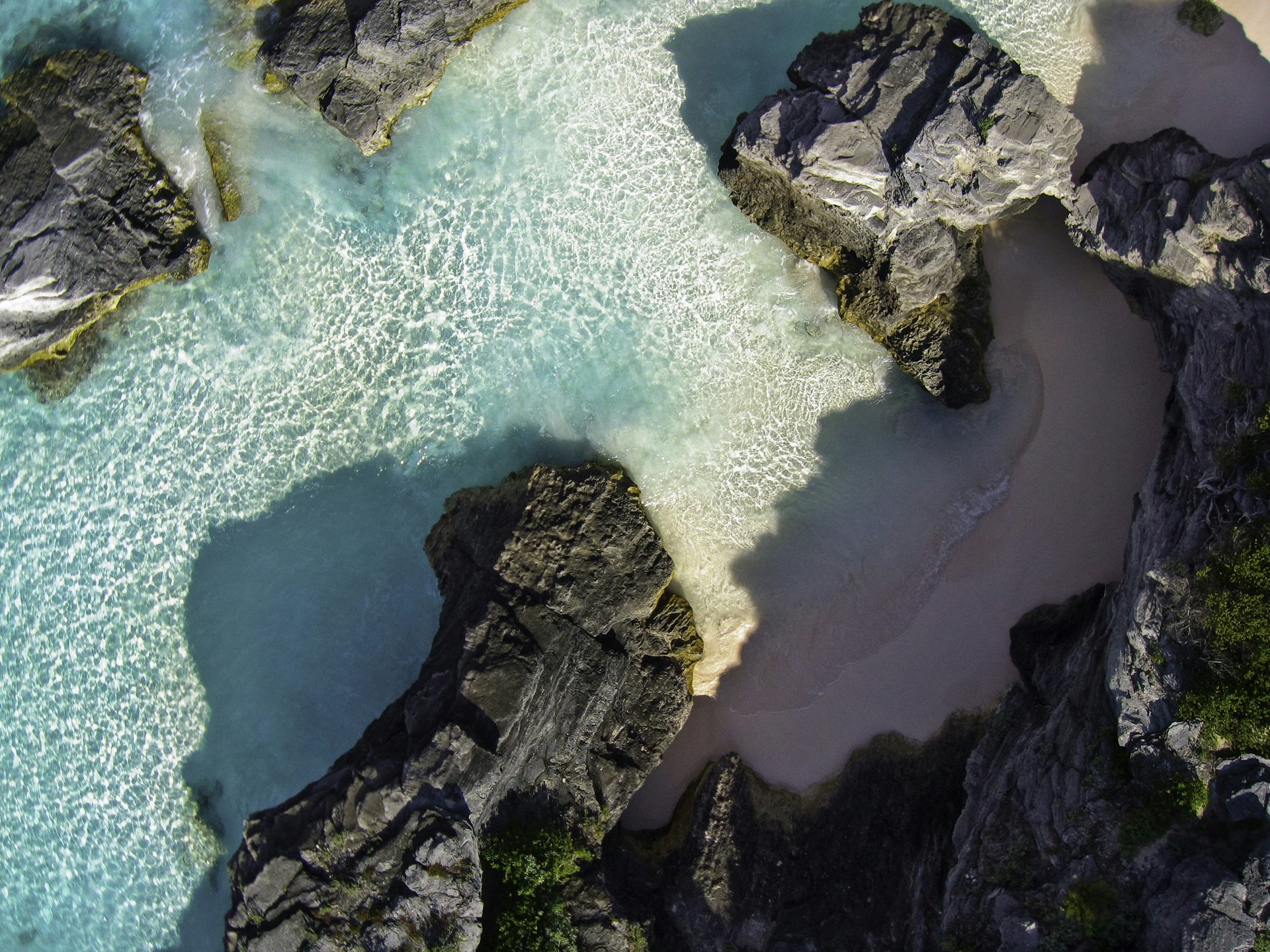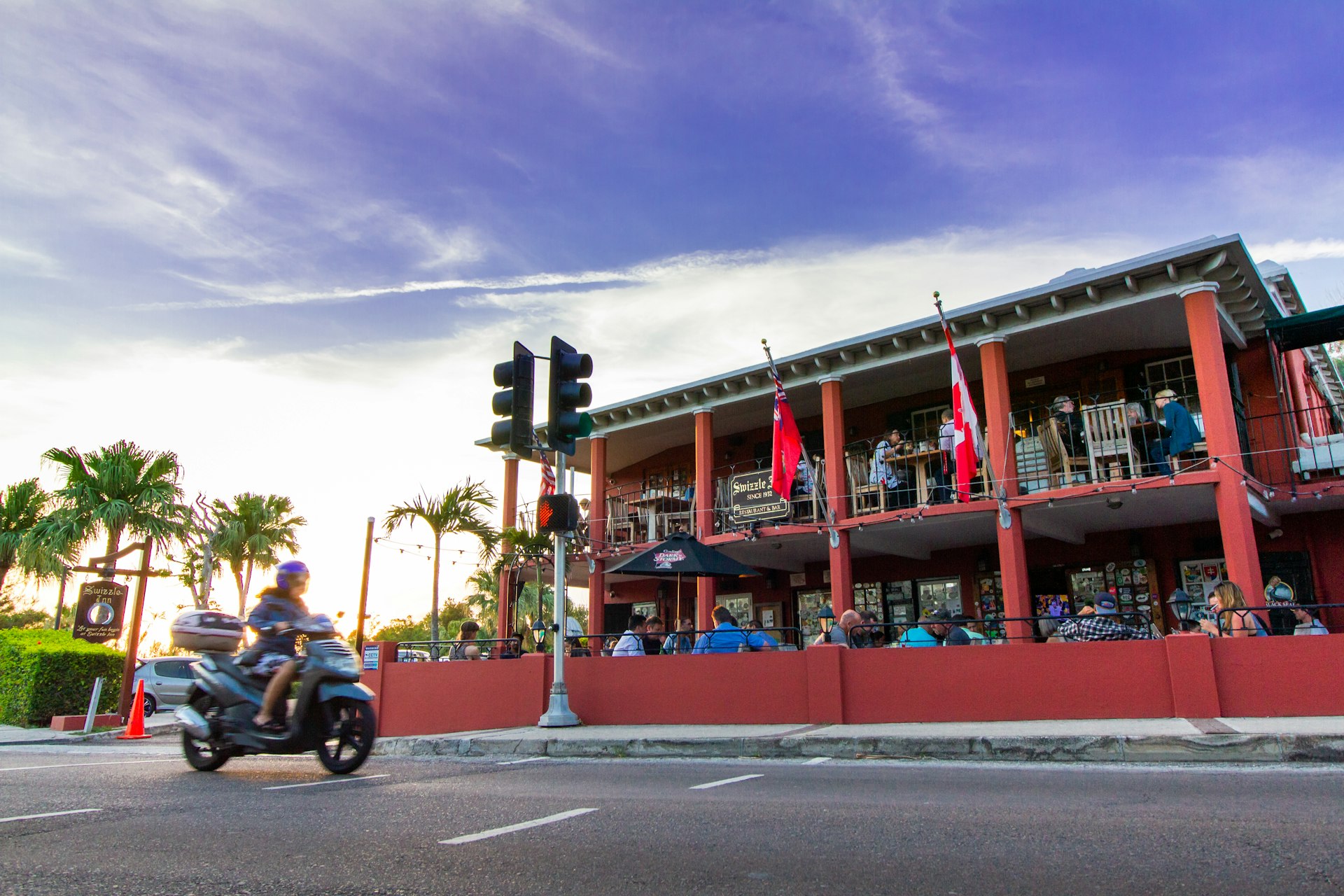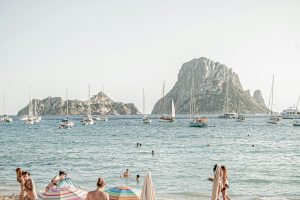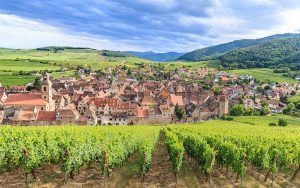
The subtropical island of Bermuda is famed for its powdery beaches, lapped by the shallow, turquoise waves of the Atlantic Ocean.
It’s an almost Caribbean experience without actually being in the Caribbean. And there’s much more to do than just relax on the beach in this British Overseas Territory. Any local taxi driver will proudly take you from one tip of this fishhook-shaped island to the other, dropping in on the historic naval yard, the sprawling botanical gardens and the pastel-colored townships that dot the island – and making some obligatory stops on those world-class beaches.
Whether your tastes run to history, culture, water sports or golf, here are the best places to visit on a trip to Bermuda.
Make the most out of every adventure with help from our weekly newsletter delivered to your inbox.  South Shore’s Horseshoe Bay is an idyllic beach with pink sand and clear waters © Photo by Scott Dunn / Getty Images
South Shore’s Horseshoe Bay is an idyllic beach with pink sand and clear waters © Photo by Scott Dunn / Getty Images
1. Bermuda’s South Shore
Best place to go for beaches
Bermuda is only 21 miles long and measures just one mile at its widest point, so the ocean is never far away. If you’re here for the sand, the South Shore serves up a scenic strip of rosy-hued, powdery beaches. Head to Horseshoe Bay for white sand and calm blue waters, Warwick Long Bay for intimate coves and the pinkest sand you’ll ever see, Church Bay for snorkeling, and Elbow Beach for an unforgettable sunset.
Planning tip: The northern end of Horseshoe Bay can get very crowded with cruise-ship passengers and their sun loungers, so if you’re looking for a bit more solitude, head to the south end to find a quiet spot.
2. Cooper’s Island Nature Reserve
Best for birdwatchers
Venture to the southeastern tip of the island, and you’ll discover the spot where island residents escape at weekends for barbecues and picnics. Formerly a restricted area occupied by the US military, and later a NASA space tracking station until 1995, the 12-acre Cooper’s Island Nature Reserve is filled with forested walking trails and shallow bays.
Today, visitors can enjoy the peaceful beaches at Clearwater and Turtle Bay. Be sure to bring food and drinks for a subtropical picnic. Include time for a casual walk in the reserve, and end the day spotting turtles and seabirds at Cooper’s Island Beach. One bird you’re sure to see soaring above the azure waters is the longtail (aka the white-tailed tropicbird) with distinctive black markings on its white feathers and long, sinuous tail feathers. Bermudians consider this bird a harbinger of spring.
Planning tip: For more encounters with Bermudian wildlife, contact the Bermuda Zoological Society to arrange a trip to Nonsuch Island, set aside as a reserve for Bermuda’s national bird, the cahow.
 Pastel-colored Hamilton is the island’s lively capital © larigan – Patricia Hamilton / Getty Images
Pastel-colored Hamilton is the island’s lively capital © larigan – Patricia Hamilton / Getty Images
3. Hamilton
Best for experiencing local culture
It might be hard to believe, but the pastel yellow and pink houses that line Front Street are actually busy workplaces. Hamilton is the island’s capital, where the majority of residents work, and downtown is a bustling cluster of retailers, restaurants and bars.
If you love shopping, visit Atelerie for clothing and The Island Shop for hand-painted designer goods such as plates, glasses, pillowcases and table runners. The English Sports Shop showcases more traditional island attire, and you may even be able to pick up a pair of Bermuda shorts (a wardrobe staple for male office workers on the island).
Planning tip: Foodies should stop at Huckleberry in the Rosedon Hotel for brunch and reserve a table at Barracuda Grill for a fine dining seafood meal in the evening. If you’re a fan of English pubs, Astwood Arms offers a similar vibe, while Yours Truly is more like a speakeasy with craft cocktails.
4. Bermuda Botanical Gardens
Best for nature enthusiasts
On the ocean-circled island of Bermuda, it’s rather magical to visit a different kind of sea — a sea of green. The Bermuda Botanical Gardens consist of 35 acres of lush vegetation, including Bermuda cedars, subtropical fruit and Banyan trees, cacti, and an aromatic garden.
Stroll through the gardens at leisure or join a free walking tour on Tuesdays, Wednesdays and Fridays at 10:30 am (call ahead to confirm). You’ll also find the Masterworks Art Museum here. Housed in a former arrowroot-processing factory, the museum showcases photographs, paintings and sketches from local artists. Be sure to stop by Homer’s Cafe, which is open for breakfast and lunch. The botanical garden is also the setting for Camden House, a Georgian mansion from the 1700s. It’s the official residence of the Premier of Bermuda and a fine example of traditional Bermudian architecture.
 The Swizzle Inn is Bermuda’s oldest pub, famous for the island’s favorite rum-filled cocktail © Big Blink Creative / Shutterstock
The Swizzle Inn is Bermuda’s oldest pub, famous for the island’s favorite rum-filled cocktail © Big Blink Creative / Shutterstock
5. St George’s
Best for history buffs
The parish of St George’s occupies Bermuda’s East End, stretching from the airport that once served the US Air Force and Royal Air Force to the town of St George’s, a Unesco World Heritage Site that brims with history. At the center of St George’s, you’ll find a plethora of local boutiques and St Peter’s Church, the oldest continuously used Protestant church in the New World.
No trip to the East End would be complete without a stop at Fort St Catherine. While dozens of historic forts dot the island, this 17th-century artillery fortress overlooks the reef where the original founders of Bermuda were shipwrecked in 1609.
This side of the island also houses Tobacco Bay, the hub for a truly local beach bar scene, and the Crystal Caves, a striking underground formation created during the last Ice Age. Also here is Tom Moore’s Jungle – a nature reserve where you can swim through protected limestone caverns.
Planning tip: For refreshments in St Goerge’s, enjoy a fish sandwich and a Dark ‘n Stormy at White Horse Pub on the waterfront, or venture a little further out to Swizzle Inn – Bermuda’s oldest watering hole, and a great place to try the rum-based cocktail that gave the pub its name.
6. Royal Navy Dockyard
Best for fans of maritime history
On the island’s west side, the old Royal Naval Dockyard was in use from the 1700s to the end of the Cold War in 1995. This historic monument is a powerful symbol of the island’s past as an outpost of empire. Today, the Dockyard is a tourist draw, with locally-inspired boutiques and retailers, including The Bermuda Rum Cake Company, specializing in rum-soaked treats.
Stop by The National Museum of Bermuda, home to more than 75,000 artifacts exploring the island’s maritime history. Be sure to check out the museum’s collection of objects excavated from shipwrecks spanning five centuries. For something more active, visit Snorkel Park Beach for an afternoon of water sports, food and cocktails. Take the ferry for added maritime value; seeing Bermuda from the water is a memorable experience.
Planning tip: For good old English pub grub, head to the Frog & Onion Pub located in the 18th-century cooperage in the Dockyard. Right next door is the island’s only microbrewery, the Dockyard Brewing Company.
 You’ll find plenty of golfing options in Bermuda, including in Tucker’s Town © Maatman / Shutterstock
You’ll find plenty of golfing options in Bermuda, including in Tucker’s Town © Maatman / Shutterstock
7. Tucker’s Town
Best for golfers
On an island renowned for its world-class golf courses, Tucker’s Town stands above the rest. This area has gone rapidly upmarket since the opening of the Rosewood Hotel in 2009, and the Mid Ocean Club and Tucker’s Point Golf Course cater to the premium golfer. These top-flight courses have hosted various PGA Tour events, including the PGA Grand Slam.
Planning tip: You don’t need to be a professional to play at either 18-hole course, but you will need to pay a pretty penny to tee off here. When you finish your round, both clubs have private beaches where you can beat the heat in style.
8. Gibbs Hill Lighthouse
Best view of the island
Located in Southampton Parish along the South Shore beach strip, Gibbs Hill is one of the few “hills” in Bermuda, though it’s really a hummock. Climb 185 winding steps to the top of the old lighthouse – built in 1846 – for one of the best views of this verdant island. Note the white limestone roofs of local houses, designed to help catch rainwater, which the island relies on as a primary water source.
Planning tip: To recharge after climbing the lighthouse, head back down to the base for a stylish Indian lunch or dinner at Tamarind.



